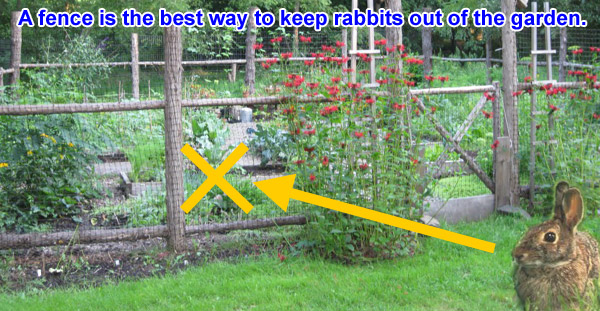How to Keep Rabbits Out of Garden
Need rabbit removal in your hometown? We service over 500 USA locations! Click here to hire us in your town and check prices - updated for 2025.If you have a vegetable garden in your back yard, chances are something is going to eat your vegetables. A large, motley crew of animals will be tempted into a garden, and some are more destructive than others. Rabbits are often the most destructive grazers, where deer and small, tree-dwelling mammals will be disinclined to linger too long. Rabbits are surprisingly tolerable of people, so it takes more than a shout from the kitchen window to scare them off. Rabbits live in almost every habitat in the United States, as well as various countries around the world. The creatures have a very long breeding season, and can have a litter of babies as often as every thirty days. With such a steady rate of reproduction, it is understandable why rabbits can manage to wipe out an entire garden overnight. Like rodents, rabbits have teeth that continuously grow and must be kept to a manageable length by chewing. This instinctual need to chew and eat makes the rabbit a formidable veggie predator.
To keep a rabbit out of your garden, you’ll want to install a fence. Fencing is the most humane and non-invasive way of keeping your vegetation safe. A rabbit will rarely try to chew through a wire fence unless there is absolutely no other food anywhere else. As herbivores, rabbits can forage on a variety of grasses, so breaking down fences to enter a garden is unnecessary to them. Your fence doesn’t have to be pretty. It can be made from a roll of chicken wire or other inexpensive wire mesh. You want to make sure to have a heavy base on the fence which is flush with the ground. While a bunny may not chew through a fence, it can definitely burrow under it. Gaps at the base of your fence will indicate that it is possible to get through if the rabbit makes the attempt. If a solid base isn’t within your budget or skill level, making your fence slope outward at a gradual angle will discourage animals from digging underneath it. Again, even if the fence slopes outward, it still needs to be flush and anchored to the ground.
 If you doubt the power of the fence and want to try some of the other anti-rabbit ideas out there, you have a variety to pick from. Mothballs, the most frequently recommended animal repellent, are not safe for use around edible plants. In all honesty, mothballs rarely work anyhow. Similar results are achieved with the use of predator urine or dirty cat litter sprinkled around the garden. Rabbits do fear their natural enemies; however, just because an area smells like a cat doesn’t mean one is around. Bunnies know this just as well as you or I. Another common trick is to leave clippings of human hair around the garden. As with the cat litter, human hair in and of itself is not threatening. A person in the garden is threatening, not the hair they leave behind. If you really want to try the human hair trick, at the very least it does act as a decent fertilizer.
If you doubt the power of the fence and want to try some of the other anti-rabbit ideas out there, you have a variety to pick from. Mothballs, the most frequently recommended animal repellent, are not safe for use around edible plants. In all honesty, mothballs rarely work anyhow. Similar results are achieved with the use of predator urine or dirty cat litter sprinkled around the garden. Rabbits do fear their natural enemies; however, just because an area smells like a cat doesn’t mean one is around. Bunnies know this just as well as you or I. Another common trick is to leave clippings of human hair around the garden. As with the cat litter, human hair in and of itself is not threatening. A person in the garden is threatening, not the hair they leave behind. If you really want to try the human hair trick, at the very least it does act as a decent fertilizer. The last option you have before calling the fence company is to plant some more enticing food sources somewhere away from your garden. Rabbits love clover, so a clover plot down by the garage might work. The downside to this tactic is that you are encouraging rabbits to loiter in your yard, and it doesn’t take long for one rabbit to turn into twenty. Planting a rabbit-specific food plot is generally ill-advised. An abundance of rabbits will lead to rabbits burrows, called warrens, under your sheds and outbuildings. Given the speedy reproduction rate of bunnies, a community of them is the last thing you want as they will graze in your yard and do massive damage to your landscaping.
How to get rid of rabbits - my main rabbit removal info guide.
Rodent-Removal.com is written by a professional nuisance wildlife control operator. It is my goal to provide education about safe, responsible & effective solutions to human-wildlife conflicts. I provide a lot of "how-to" info, but in many cases, wildlife removal is complex, dangerous, and subject to local laws. Sometimes I recommend hiring a professional. I have spent over 10 years now training and investigating companies all over the United States, serving over 650 USA cities and towns. I believe my hand-picked list is far better than what you'll find on a standard web search by yourself. For my recommendation of a local critter trapper in your area, click here for my nationwide list of 100's of professional wildlife control experts.





